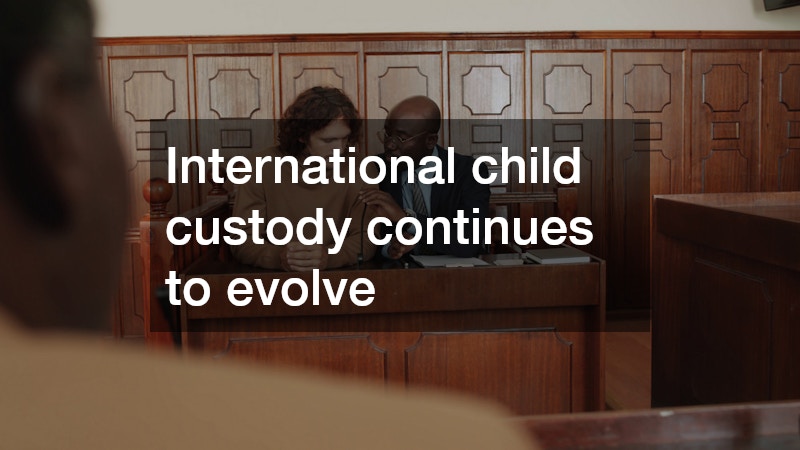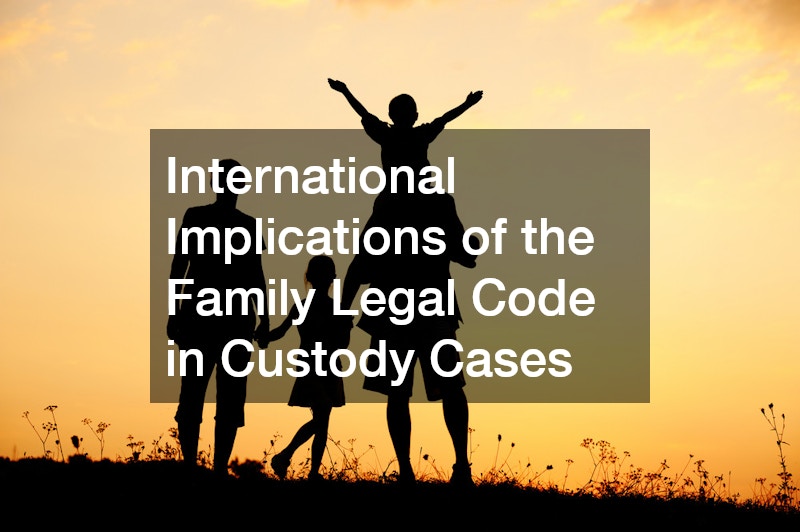
The globalization of family life has led to increasingly complex legal issues, particularly in the realm of child custody. With the rise of multinational families, diverse legal systems, and varied cultural norms, the influence of international family law codes and the broader family legal code has become a pivotal consideration in custody cases. This article seeks to explore these implications and address the most pertinent questions surrounding this intricate topic.
The Role of International Family Law Codes in Child Custody
As families become more diverse and cross borders with increasing frequency, international family law codes have become an instrumental part of resolving child custody disputes. These codes aim to provide a consistent and fair approach to custody issues by establishing agreements like the Hague Convention on the Civil Aspects of International Child Abduction. This framework seeks to protect children from wrongful removal or retention across international boundaries and ensures their prompt return to the country of habitual residence.
Can Parents Choose Jurisdictions for Favorable Outcomes?
In the realm of international child custody, the phenomenon of “forum shopping,” where parents attempt to secure a favorable jurisdiction for their case, is both a challenge and a reality. Differences in custody laws across countries can incentivize parents to file for custody in locations where they expect a more favorable outcome. This practice can lead to jurisdictional conflicts and complicated legal proceedings that can delay resolutions and increase costs for the involved parties.
The challenge of forum shopping is compounded by the fact that legal systems worldwide vary widely in what they consider the child’s best interests. For instance, some jurisdictions emphasize maintaining the child’s cultural and linguistic continuity with one parent, whereas others might prioritize living arrangements or economic stability. Such diverse criteria can lead to significantly different custody outcomes depending on the jurisdiction, thus fueling the desire to manipulate the choice of forum.
How Do Cultural Differences Affect International Custody Cases?
Culture plays a crucial role in international custody cases, as it deeply influences parental expectations, custody arrangements, and the perceived welfare of the child. Different cultures have distinct perspectives on parenting roles, discipline, and the importance of maintaining cultural heritage within the family. These perspectives can significantly influence custody disputes, leading to complex legal battles when parents hail from different cultural backgrounds.
For instance, in some cultures, extended family involvement is a crucial element of child-rearing, whereas others prioritize nuclear family structures. Such differences can feed into custody negotiations, where one parent may argue for the importance of cultural immersion with relatives, while the other may advocate for a more Western-centric model of upbringing. Legal systems must navigate these differences sensitively, recognizing that cultural preservation and adaptation are often in the child’s best interest.
What Legal Challenges Arise with Co-Parenting Across Borders?
Co-parenting across borders presents a unique set of legal challenges that require careful navigation and thoughtful solutions. Communication barriers, logistical issues, and differing legal systems can complicate co-parenting arrangements, making it challenging to ensure consistent parenting and stable environments for children. International laws attempt to address these challenges by offering guidelines for cooperative parenting agreements and dispute resolutions, but practical implementation remains complex.
One significant legal challenge is the enforcement of custody agreements across borders. Even when agreements are recognized by both countries, practical enforcement can be problematic. National laws may vary in how they perceive parental rights, child support obligations, and visitation schedules, leading to enforcement delays or refusals. Parents and professionals must be vigilant in understanding each jurisdiction’s legal landscape and establishing clear, mutually agreeable terms within their co-parenting plans.
How are Child Custody Laws Evolving in Response to Globalization?
Globalization has catalyzed changes within the realm of child custody laws, prompting reforms designed to address the complexities of multinational families. Legal systems are recognizing the importance of adaptability and cultural sensitivity, striving to create legislation that reflects the new globalized social fabric. This evolution involves reconciling international standards with national laws, while fostering cooperation among countries to protect the welfare of children.
One significant area of evolution is the increasing recognition of the child’s voice in custody proceedings. More jurisdictions are adopting practices that consider children’s perspectives, emphasizing their agency and welfare. This shift aligns with international child rights movements, which advocate for children’s participation in decisions affecting their lives. Incorporating their voices contributes to outcomes that more accurately reflect children’s needs and desires.
As the world becomes increasingly interconnected, the legal landscape for international child custody continues to evolve. While international family law codes provide a framework to address cross-border custody disputes, they also present a myriad of challenges. Understanding the cultural, legal, and ethical dimensions of these cases is essential for parents, legal professionals, and policymakers alike. This article has explored the key questions surrounding international custody cases and highlighted the ongoing need for legal adaptability in our globalized world.




